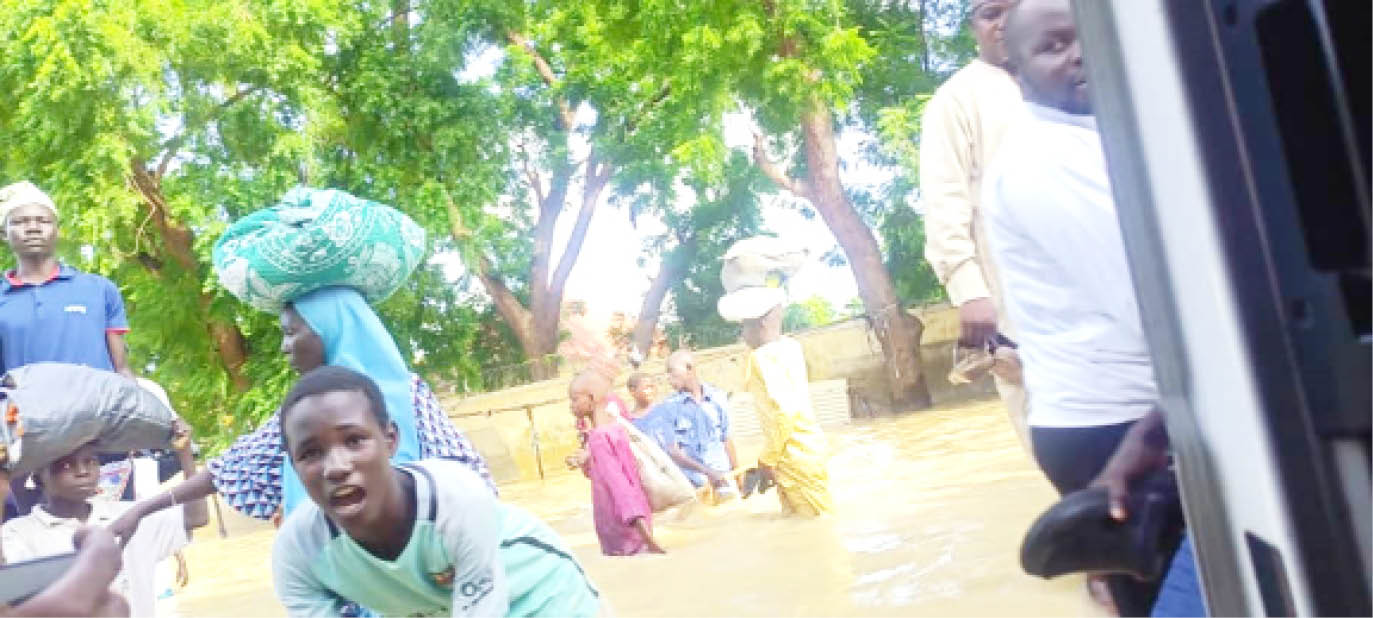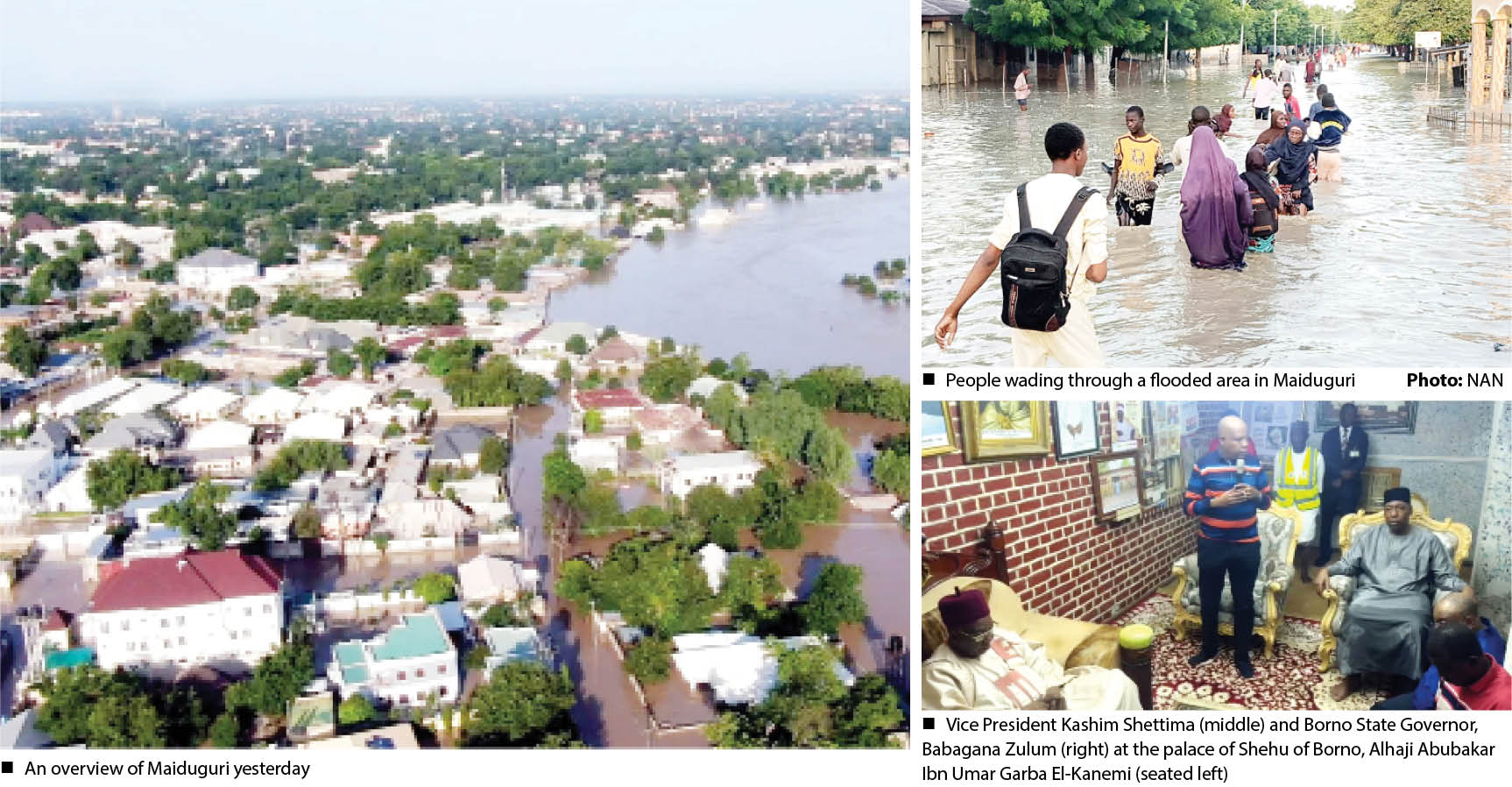The flooding that hit Maiduguri, the Borno State capital, in the wee hours of yesterday has submerged hundreds of houses and destroyed lots of properties.
The National Emergency Management Agency (NEMA) confirmed that over 200,000 people were displaced.
An unspecified number of people, including children are still missing.
Many properties including, houses, farmlands and business places have also been destroyed.
- Doctor swims through flood to perform life-saving surgery
- NIGERIA DAILY: How Nigeria Gears Up For A China-Powered Future
The residents, most of who are from Jere Local Government Area, have been forced to vacate their homes.
The flooding followed the collapse of the Alau Dam, which overflowed its banks from about 10 kilometres away into the state capital.
Residential and business areas have been submerged, including the popular Monday Market and thousands of homes and properties, such as the Palace of the Shehu of Borno, Shehuri, Gwange, Adamkolo, Gamboru, Fori, Bulabulin, Post Office areas, Moromoro, and Customs Bridge, among others, have also been affected.
Many of the residents, who spoke to Daily Trust, said they could not locate their loved ones.
Some of those who spoke to our correspondent said the last time such a devastation enveloped Maiduguri and environs was about 30 years ago.
A resident, Fatima Ali, said: “I managed to escape, but my parents and six siblings remain trapped. I want to appeal to the government to do everything humanly possible to rescue them.”
A shop owner, Ibrahim Musa, said: “We just fled the zoo area for fear of being attacked by the escaping wildlife. All the shops around the popular Monday Market and post office have been submerged by the flood.”

Many traders at the Monday Market watched helplessly as their wares were washed away by the flood.
A sugar and flour trader, Muhammad Bulama said: “Our goods worth billions of naira have been submerged. Just pray for us.”
Ibrahim Jirgi, who covered the 1994 flood incident in Maiduguri for the BBC and the Daily Times, said climate change could be responsible for the latest incident.
“During the 1994 incident, the whole of Maiduguri was taken over by water. People climbed trees to survive and many residents thought that the world had come to an end,” he said.
Corpses exhumed as cemetery is washed away
The Gwange Cemetery in Maiduguri was also washed away, leaving corpses floating in the streets.
A resident said: “The cemetery is already flat and the water pressure exhumed corpses from several graves. Women and children are traumatised by the horrific sights.”
Many patients at the University of Maiduguri Teaching Hospital (UMTH) were also stranded as the facility was submerged.
Ali Galadima, whose wife was on admission at the UMTH, said patients were evacuated upstairs as the ground floor was flooded.
“She was complaining of hunger but the water level couldn’t allow me to access the hospital. In fact, many patients’ relatives are stranded looking for ways to access them,” he said.
Sources in Gwange area said many children might have drowned.
“You can see some mothers crying, looking for their little children,” he said.
A woman, who gave her name as Ya’ana, said: “I was awakened by my neighbours around 3:30am. I became terrified when I saw water gushing into our house. I tried to save my children from drowning, but I still could not see two of my children.”
Maiduguri on high alert
Acting Zonal Coordinator, NEMA, Sirajo Garba, said they have placed Maiduguri on high alert following the magnitude of devastation of the flood in the last 24 hours.
He said the agency, alongside others, had worked diligently to rescue victims trapped in flood-affected areas but could not give the number of people killed by the flood.
Experts warn of epidemic as corpses float
The Chairman of the Association of Resident Doctors, Abubakar Ngubdo, warned that the state was at the high risk of water-borne diseases as the flood had contaminated the surface water in the affected areas.
“There would be pollution because corpses floated, sewages, septic tanks and refuse dumps are also there. So there would be contamination of water.
“The government should swing into action to prevent epidemic because floods can lead to water-borne diseases like diarrhoea, cholera and typhoid fever,” he said.
“There is need to provide good camping of the displaced, clean and portable drinking water, toilets and healthcare for them.
“And for those who show early signs of the diseases, they should quickly be attended to medically,” he added.
80% of animals in zoo dead
The General Manager of Sanda Kyarimi Museum Park, Maiduguri, Ali Abatcha, said 80 per cent of the wildlife in the zoo were killed by the flood.
Abatcha, in a statement, said deadly animals like crocodiles and snakes had been washed away into the communities.
He asked the public to be aware and take all the necessary precautions to avoid attacks by the animals.
Govt reopens IDPs camps for victims
The Borno State Government yesterday reopened several Internally Displaced Persons (IDPs) camps to accommodate people affected by the flood.
Daily Trust observed thousands of people moving into the camps, prompting aid agencies to assist with the registration of the displaced.
The spokesman of the state police command, Kenneth Daso, in a statement, advised citizens to avoid flooded routes and stay in safer locations.
“Following the devastating effect of the flooding, citizens are advised to avoid flooding routes and stay in safer areas as police and other relevant government agencies are doing everything possible to ensure the safety of lives and property,” he said.
Insurgents killed as Sambisa forest flooded
The flood is also said to have destroyed the enclave of the Boko Haram, Dollarland, in Sambisa forest, killing many of the insurgents and their families. Credible sources in the security circle disclosed this.
A source told Daily Trust that dozens of insurgents, including their women and children, had drowned.
The source said the flooding hit the terrorists’ hideout at about 2am when most of them were asleep.
“You know, the enclave is a swampy area. Severe flooding from River Yedzaram went into the Dollarland and swept the location.
“The insurgents were hit massively by the devastation, over 100 corpses have been buried by the insurgents,” the source said.
He said the flood also displaced many insurgents in Gwoza area.
The flood also destroyed a part of the old prison from where many inmates were evacuated to the new maximum security prison in Maiduguri.
A security source, who confirmed this to our correspondent, said the incident happened around 5am.
There were reports (which Daily Trust could not independently confirm) that some prison inmates were evacuated, and that some of them escaped.

 Join Daily Trust WhatsApp Community For Quick Access To News and Happenings Around You.
Join Daily Trust WhatsApp Community For Quick Access To News and Happenings Around You.


